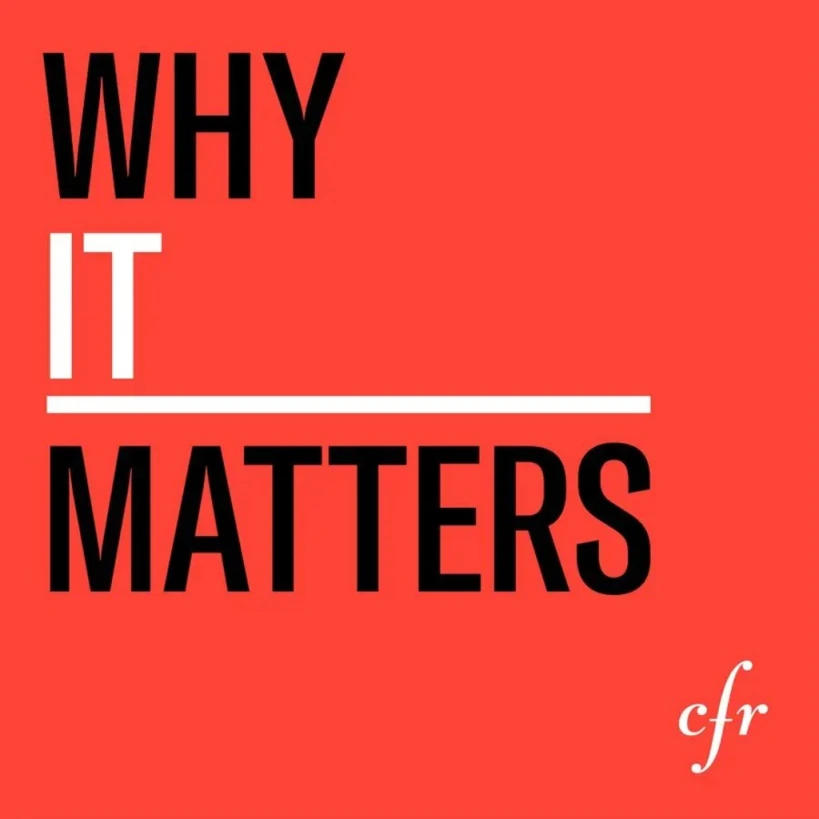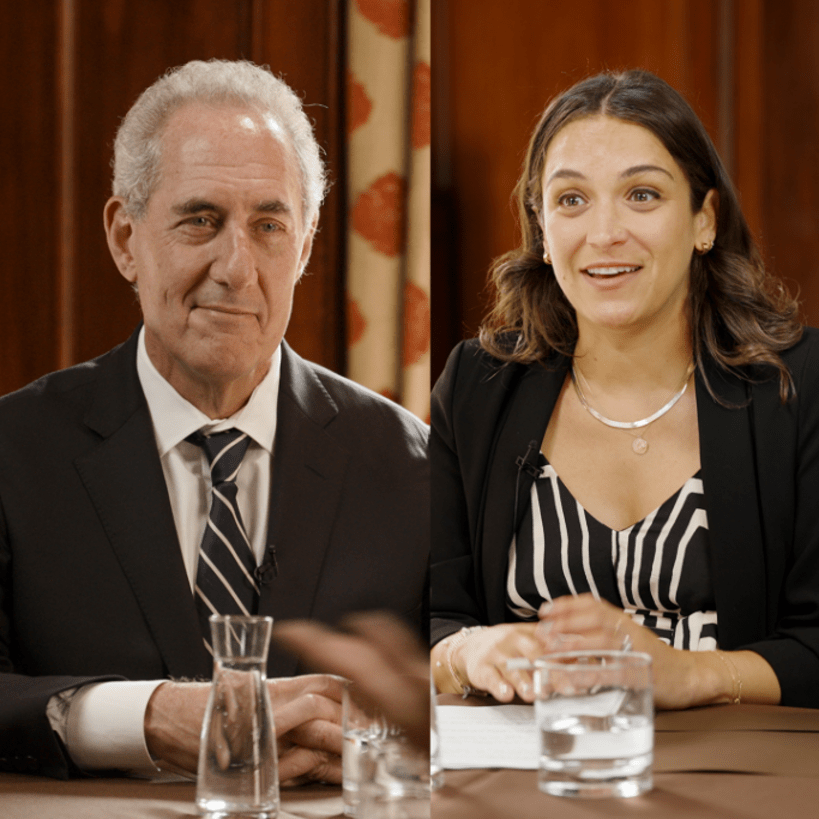India, Modi, and Hindu Nationalism
Prime Minister Narendra Modi is the most popular man in India. On track to be elected for a third term, he has boosted the country’s global standing and propelled strong economic growth while consolidating power and galvanizing majoritarian support for his Hindu nationalist agenda—all while growing closer to the United States. How could Hindu nationalism reshape India?
Published
Host
- Gabrielle SierraDirector, Podcasting
Guests
- Ashok SwainHead of the Department of Peace and Conflict Research, Uppsala University
- Hartosh Singh BalExecutive Editor, The Caravan
Supervising Producer
- Asher RossLead Content Strategist
Audio Producer and Sound Designer
Associate Podcast Producer
Show Notes
India today is a vastly different country than it was just ten years ago. Since Prime Minister Narendra Modi took power in 2014, it has become the world’s fifth-largest economy, tens of millions of people have been lifted out of poverty, and it has become a critical U.S. partner in its strategy to counter China. At the same time, Modi has overseen a crackdown on criticism, including from the press, academics, and opposition politicians. He has also pursued legislation that makes it harder for Muslims to participate in India’s democracy.
Experts say this push toward Hindu nationalism is just part of Modi’s mission to remake India. But will the rise of nationalist forces in the world’s most populous country affect its warming ties with the United States?
From CFR
Lindsay Maizland, “India’s Muslims: An Increasingly Marginalized Population”
Manjari Chatterjee Miller, “India’s 2024 General Election: What to Know”
Manjari Chatterjee Miller, “China and India Compete for Leadership of the Global South”
From Our Guests
Ashok Swain, “India Must Stop Spreading Hindu Nationalism to its Global Diaspora,” Nikkei
Hartosh Singh Bal, “The End of Secular India,” Foreign Affairs
Hartosh Singh Bal, “The Tyranny Will Get Worse,” The Caravan
Read More
Eram Agha, “Cheques and Imbalances: The Taming of the Election Commission of India,” The Caravan
Siddhartha Deb, “Modi’s Temple of Lies,” New York Times
Gerry Shih, “Inside the Vast Digital Campaign by Hindu Nationalists to Inflame India,” Washington Post
Watch and Listen
“India Burning,” VICE News
Transcript
ABC News In-Depth: Modi has awakened Hinduism.
India Today: India was always a Hindu state, and will always be.
BBC News: Those who have gone out of the Hindu four must be brought back in whole! Brought back into the Hindu faith, brought back to the mother faith.
CNA Insider: India’s blockbuster Prime Minister is gearing up for another election. His two-plus decades in politics is likely to get him his third term.
Al Jazeera English: But some people are worried about the direction the country is going in - one that prioritizes India’s majority Hindu population, and threatens minorities, especially Muslims.
In about two weeks, India will publish the results of its national elections. Indian democracy is famous for its raucous nature and its massive scale, but this cycle does not have much in the way of suspense. Because for the past ten years, Prime Minister Narendra Modi has enjoyed extraordinary popularity and power, and most analysts expect that he will be starting his third term in office this summer.
During his tenure, India has changed dramatically. It has become the world’s fifth-largest economy and tens of millions of its people have been lifted out of poverty. It has also emerged as a critical partner of the United States amid intense competition with China.
But there’s a second story alongside this one. Modi has become increasingly repressive - he has cracked down on the press, jailed opposition leaders, and many observers say he has manipulated the courts. Perhaps most disturbing is that Modi runs on a platform of Hindu nationalism, which threatens to upend India’s secular constitution and marginalize millions of Muslims.
I’m Gabrielle Sierra and this is Why It Matters. Today, how Hindu nationalism is reshaping India.
Hartosh Singh BAL: This is a marginalization on a scale that has not been attempted in human history anywhere.
This is Hartosh Singh Bal. He’s the executive editor of The Caravan, a politics and culture magazine based in New Delhi, India. In April, he wrote an article in Foreign Affairs about Modi’s Hindu nationalism, titled “The End of Secular India.”
BAL: The marginalization, the displacement of Muslims that is happening in India - over 15 percent of India’s population - that’s 200 million people. That’s larger than almost any country in the world, maybe just a little short of the U.S. population. And it is supposedly being done democratically and the world is standing by and watching. This actually on any human terms should not be allowed to happen.
Gabrielle SIERRA: So if Hindu nationalism becomes the de facto rule in India, what would happen then?
BAL: In some senses from 2014 onwards, India is already de facto a Hindu nation. The lives Muslims are leading or minorities are leading, if you see every Indian election, you look at how people are polling, Modi’s support comes entirely from the Hindus. He has just been blatantly outright what amounts to Islamophobia. He’s referred to them as infiltrators from outside, etc.
Narendra Modi (overdubbed)/The Times and The Sunday Times: They will collect people’s wealth and distribute it to whom? To those who have more children. To the infiltrators. Do you think your hard earned money should be given to infiltrators? Would you accept this? This is what the Congress manifesto is saying.
BAL: We will see clear differences between Hindus and others in this country. We will see a country which will have almost a two-tiered citizenship. I think one of the first signals of that was a law that was passed which dealt with citizenship for refugees in India’s neighboring states. That said that minorities which were victims of religious persecution in India’s neighboring states could get Indian citizenship. The only minorities facing persecution who were not included in this law were Muslims. They are not allowed to claim citizenship under this law.
Like the United States, India’s constitution provides protections against discrimination on the basis of religion or race. Many observers believe that the proposed citizenship law threatens India’s secular ideals.
Amnesty International describes it as “inconsistent and incompatible with India’s international human rights obligations.”
BAL: This is the first time in India that a religious basis for a citizenship law has been invoked. It has never been the case, and I think this is the kind of expansion we will see. That citizenship rights, a two-tier country where Hindus are superior citizens, where minorities live at the behest of the majority, this is where we are headed in terms of legally what we are going to see. I think at some point, they would want to change the very preamble of the Indian constitution. We claim we are a socialist, secular, sovereign republic. They would want the word Hindu somewhere there at some point or the other, but much more than that, that it should work into the legal prescriptions of how a Hindu citizen should differ from any other person in India would be very clear. I think that is, in terms of real achievement, it is a prelude to where they want to end up with the idea of citizenship within India. But it’s a clear indication that you can distinguish between Hindus and Muslims as citizens, and that is but the beginning of a larger agenda that is yet to be implemented.
Tension between Muslims and Hindus in India isn’t new - but what Bal is discussing here is a relatively recent development. After years in office, Prime Minister Modi has brought about a surge of Hindu nationalist support, and has had several legislative victories in his push.
SIERRA: Okay, there’s a lot to unpack here and I want to get to all of it, but it feels like I need to know the basics before I dive in. So let’s start on the most basic level, a definition. What is Hindu nationalism?
BAL: It’s the idea that India is exclusively a state for Hindus. Everybody else must live at the forbearance of the Hindus. India’s definition as a nation, as a cultural identity must be a Hindu identity. Hindu nationalism seeks to establish such a government in India. India’s current ruling party is the Bharatiya Janata Party. Its very basis of existence is Hindu nationalism. It is ideological. It draws its strength from a parent organization called the Rashtriya Swayamsevak Sangh, whose idea is that India should be a Hindu nation, cultural nationalism. There is no BJP without Hindu nationalism.
As India’s current prime minister and the leader of the Bharatiya Janata Party, better known as the BJP, Narendra Modi is considered by many to be the face of Hindu nationalism. And he’s been part of the movement for years - now in his 70s, Modi has been active in the Rashtriya Swayamsevak Sangh, or RSS, since he was just 19 years old. So if Modi wins, many believe Hindu nationalism will as well.
BAL: In India, what we are likely to see is that the facade, the structures of democracy, they will continue to exist. It is very important for Modi and his government to project that we are a functional democracy, but the spirit in which constitutional democracy operates, that is being sucked out.
The consequences of a less democratic India are potentially severe, but the U.S. doesn’t seem like it’s going to put a check on Modi’s authoritarian tendencies anytime soon - or at least not publicly. Here’s a statement from Lisa Curtis, senior fellow and Director of the Indo-Pacific Security Program at the Center for New American Security, who recently spoke at a CFR event on India’s upcoming elections:
Lisa CURTIS: I think that you are right to raise these issues. I would just note that, you know, for India itself, for Indian leaders who pride themselves in being a democracy, the fact that Muslims account for 14 percent of India’s population yet only 5 percent of the parliamentary seats is something that maybe they need to think about or address. But I think, you know, one thing we have to keep in mind is the U.S. is also not a perfect democracy. We have our challenges and our issues as well. And so I think that this is another reason why raising these issues privately, quietly, discreetly makes a lot of sense, because certainly, you know, many democracies have their challenges, and the U.S. is no exception.
SIERRA: Taking a step back a little further, why does India matter to the U.S.?
BAL: The American belief in pragmatic terms is that India is this great potential partner against the threat that China poses. But I think if they are thinking that if Indian interests are up for stake and India is going to choose the West over China on some purely ideological grounds, that’s not going to happen. The kind of shared supposed worldview that Modi keeps projecting and the U.S. does not do much to actually dispel, it would not have been possible without the China threat in circus. I think the U.S. are perfectly willing to live with anything that Modi does domestically.
The international NGO Freedom House, which measures the state of democracy in every country, rates India as only partly free, noting its ruling party has “presided over discriminatory policies and a rise in persecution affecting the Muslim population.”
SIERRA: How else has Modi’s Hindu nationalism changed India’s democracy?
Ashok SWAIN: We are seeing that the media, which is extremely important. Not only they are supporting the government, they’re actually becoming the megaphone of Modi’s policies, as well as also dividing the country in the Hindu-Muslim, Hindu-Christian way. Because they know that that’s what helps the Hindu nationalist party in power and so they are the one, those who are actually dividing the country more than anyone else.
This is Ashok Swain. He’s a professor and head of the Department of Peace and Conflict Research at Uppsala University in Sweden.
SWAIN: So that kind of institutional strength, the democratic institutional strength which we see in the West, like in the U.S. or Canada or in Europe, part of Europe where I live, in Sweden, there have been all these rise of forces which are working against the democracy, working against the secular principle. They want to create their own brand of country, but at that time these key institutions, particularly press, judiciary, are really not taking up their position and protecting this. That’s not happening in India, that’s unfortunate.
According to the media watchdog Reporters Without Borders, India ranks 159th out of 180 countries on press freedom. The group says that India’s media has fallen into an “unofficial state of emergency” since Modi took power. Critics like Ashok feel that that puts Modi more in line with authoritarians than leaders of other democracies.
SIERRA: Has Washington enabled Modi to create a Hindu nationalist state?
SWAIN: U.S. doesn’t play the long card, and I think that they would realize India will be a partner and ally of strength, which can really be a force to checkmate China or Russia. And this is where if you create another Putin in India or another Xi in India, it is not going to help you. So in that sense, I see the West having the problem, particularly Washington is having the problem, that whom they can otherwise find in that region who can play against China? But I don’t think anyone in the west, or Washington, has any kind of illusion that India is going on the right path.
SIERRA: Hindu nationalism also seems to be growing in popularity at the same time as Modi employs tactics common among authoritarians trying to stay in office like this recent citizenship law, the repression of the media. How much of this do you think is his long-term crusade to create a Hindu India versus him using Hindu nationalism as a tool in his tool belt to consolidate power? Do you think Modi is a true believer in this mission?
BAL: I do think he’s a true believer. I don’t think you can separate, in Modi’s case, the quest for power from Hindu nationalism. He’s imbued with its beliefs through and through. So, I don’t think in his case you can read it only as a tool. He’s a believer and that belief works in terms of getting the votes.
SIERRA: Okay let’s back up a bit then, can you give me a brief history of Hindu nationalism in India?
BAL: As it is manifest today as it is visible, it goes back to almost 100 years. In 1925 an organization called the Rashtriya Swayamsevak Sangh, the RSS, was founded. It started right from the beginning with strong streak of Islamophobia, of anti-Muslim propaganda. By the early thirties, it had grown to the extent that members of this organization traveled to meet Mussolini in Italy, to learn from Mussolini as to how a fascist organization was created. This organization grew, expanded. In the 1980s, the political wing was reconstructed under the name of the Bharatiya Janata party, the BJP, which is in power in India today. And the Bharatiya Janata party actually grew in popularity on the back of this movement to reclaim a mosque in Ayodhya, which is the birthplace of the hero and the deity of the central Hindu epic, the Ramayana.
BBC News: Ram is the faith of India. Ram is the foundation of India. Ram is the thought of India. Ram is the constitution of India.
BAL: This was the very basis on which the BJP actually came to power in the first place. And the construction of the Ram Temple, because this involved huge legal battles, it involved a huge amount of political opposition, is something that the RSS didn’t expect to see in the near future.
In 1992, a mob drawn from RSS supporters destroyed a mosque in Ayodhya, a city in India’s most populous state. In the decades that followed, Narendra Modi led a push to begin construction of a massive Hindu temple, known as the Ram temple, at the site.
After decades of work, the temple was consecrated four months ago, emerging as a powerful symbol of Modi’s commitment to Hindu nationalism. Human Rights Watch said “the consecration could stoke violence against Muslims and that it has come at the cost of Indians fearing each other.”
BAL: In the state of Gujarat in 2002, connected with the same agitation, people who had been to the site of the mosque where a temple was to be constructed, returning on a train to Gujarat a compartment of the train catches fire, the allegations are that Muslims have set the train on fire. Violence breaks out in Gujarat.
Journeyman Pictures: One carriage was torched, and fifty-eight people died, mostly women and children. Hindu mobs responded with murder and acid.
Journeyman Pictures: The violence is almost unilateral after the first incident.
BAL: The violence sees Hindu mobs come out on the streets. Muslims are targeted. The police basically stand aside, a huge number in the hundreds are killed. The chief minister at that time of Gujarat who had barely taken over less than a year before this violence happens was a man named Narendra Modi. This is the moment that creates Narendra Modi, this violence that unfolds, which his administration allows to continue, is the violence which propels him to, it should be national infamy, but it creates the sense of a man who speaks for Hindus, who acts on their behalf, who shows Muslims their places. He goes on to become a three time chief minister of Gujarat, growing into this larger than life representative of Hindu nationhood. And it is on the back of this that he comes to power at the center in 2014. Modi coming to power in 2014, and finally the Ram Temple being built is a huge achievement for them. The other thing, and this goes back to the history of the Ram Temple, right from maybe 60, 70, 80 years ago from the founding of the Indian nation, the special status of Kashmir has ranked through the RSS. It was the only Muslim majority state in India. It’s no longer a state. Its capacity as a province has been taken apart. But for the RSS, this demand was central to their worldview of what kind of country the Indian nation or Hindu nation should be.
Modi has been India’s prime minister since then. And as we mentioned at the top - he is widely expected to win another term in the current election.
More on this after the break.
SIERRA: Why is Modi so popular? What type of feelings does he inspire in his followers?
BAL: He has created this impression of Hindu victimhood going back in this imagined history over a period of a thousand years since Islam first comes into the subcontinent of Hindus never getting their deserved rights, of never being able to rule over a place that was theirs. His appeal comes directly from this Hindu nationalism of this great figure who is able to change the history of Hindu victimhood and make India a great Hindu player on the world stage in some sense.
Some experts say Modi’s popularity also derives from his focus on development and infrastructure in addition to Hindu nationalism. He presides over a fairly booming economy, despite the push towards inequality. Here is expert Milan Vaishnav, senior fellow and director of the South Asia Program at the Carnegie Endowment for International Peace, speaking at last week’s CFR webinar on India’s elections:
Milan VAISHNAV: The BJP has always had two key objectives as a party. There’s been a pillar of kind of policies around economic upliftment and then a pillar of policies/agenda behind Hindutva, or Hindu nationalism, and if we go back to Mr. Modi’s tenure as Gujarat chief minister, these were his two claims to fame. He was in Hindi referred to as the ‘king of the Hindu’s heart’ because of the policies he put into place when he was chief minister. But he was also seen as the CEO and chief who presided over an economy which boasted the fastest GDP growth rates of any Indian state. Now, when we go to 2014, he didn’t really need to brandish his Hindu bona fides - they were well known.
Modi has also succeeded in cultivating a paternal image of himself. He hosts a monthly national radio show that roughly translates to “thoughts from the heart,” in which he regularly greets his listeners as “brothers and sisters” and talks with them about bringing the country to “new heights.”
SIERRA: Is the story of Hindu nationalism in India the story of Modi’s rise, or would you say it’s a powerful movement with or without him?
BAL: The RSS itself, which is the parent body of Modi’s party, the BJP, has by now developed huge roots in Indian society. They would be comparable to the Chinese Communist Party in China in terms of the reach they have. They are there in educational institutes. They’re in every village. They run trade unions, agriculture unions, they run schools in huge numbers. They decide curriculum. So with or without Modi, Hindu nationalism now has a huge substantial presence in Indian public life. But in Modi, they found a figure, a charismatic figure who could take this all to the next level. What Modi has been able to do when he comes to power in 2014, he wins a majority in our parliamentary system, the BJP on its own, it doesn’t seek allies. That was the first time since 1984 that an Indian political party had won a majority in Parliament on its own. That allowed Hindu nationalism to start implementing its agenda in India at the national level, to tinker around with the very structure of public life as we imagined it.
SIERRA: Does Modi still run a secular state?
BAL: Not only is it not secular, it is in some real sense, totally anti-secular. As I said, de facto, this is a Hindu nation. Hindus and Muslims are not equal citizens under Modi. Muslims are treated badly, they don’t have political representation. Of the 300 odd members that the BJP has in the parliament going into these elections, not one is a Muslim. The union cabinet doesn’t have a Muslim. They have put up maybe just one Muslim candidate in all the seats they’re contesting.
There are Muslims in India’s parliament, but they are underrepresented. The BJP is running just one Muslim candidate out of 430 during the current election cycle.
BAL: In that sense, what it means is that about 15 percent of India’s population, 200 million people, have no access to political power at all. Quite apart from the threats they face, there have been lynchings, there are laws that are ghettoizing them. There are laws that make the practice of religion, the idea of conversion, that makes intermarriage between Hindus and Muslims difficult. So in that sense, in every real way, India fails to live up to the idea of secular, but far more than the idea of secular, it is just that the idea of equal citizenship for all Indians doesn’t exist today. Even if Modi were to lose power, it does not mean that you are going to have an administration that is rid of the influence of Hindu nationalism. That is a part of Indian politics that is very much there to stay. The people with the most wealth, the people with the most intellectual capital, in some ways, India’s economic and intellectual elite in terms of the power they possess, they are all behind this government. We do not have 50 percent of India opposed to Modi. We do not have institutions that are opposed to Modi. We do not have a legal machinery that is looking at the wrongdoings of Modi.
SIERRA: In the United States we have our own rising set of issues with democracy, but theoretically safeguards, like independent courts and a free press keep American democracy on the right track. Does India have those checks and balances and are they eroding under Modi and the BJP?
SWAIN: India had a very strong press, of course the press, there will be always some kind of program and tilt, but there was criticism, there was a policy that at least you could do anything without fear. Indian judiciary was getting much more stronger, Indian election commission was a star attraction for rest of the world, where they’re holding election, because it was an absolutely fantastic way holding the election at the election time. The Supreme Court and the Indian highest courts were really taking the government into task, if there is some kind of things happening. What has happened under Modi is that, in a very fast process and very surprisingly for people though you have been because I thought probably they will have so many years of strength, that they will stand up to Modi or any kind of Hindu nationalist leader or any kind of leader who wants to take away the democratic secular principles from the country, they will stand up, but that hasn’t really been that much.
Two of India’s opposition leaders were recently jailed, and their sentences were upheld by the courts before they were eventually released.
Reuters: Dozens of opposition party members have been detained in New Delhi.
BBC News: Opposition figures in India have strongly condemned the arrest of Delhi’s chief minister.
FRANCE 24 English: After fifty days, Arvind Kejriwal tasted freedom once more, released from jail nearly seven weeks after being arrested on bribery charges.
SIERRA: Is the judiciary independent or is it pro BJP? And how have you been affected by the rulings of the high court in India?
SWAIN: Two chief ministers have been in jail and the two of these chief ministers, one is the chief minister of Delhi, but both the chief ministers also are the leader of their own parties. That had never happened before and even the kind of ways the judiciary is treating them, using the language about them, that’s really worrisome. There are many of these significant issues that they have taken, with these Hindu nationalist ideas. In my case, my own overseas citizenship was canceled by the present government in India. Then I went to Delhi High Court, the Delhi High Court gave a judgment, overruled that Indian government’s policy or Indian government’s order of canceling my overseas citizenship, but in two weeks the Indian government again canceled my overseas citizenship. If the judiciary would have been that strong, would have immediately taken them into actions. Why it is not? Why it has been done? So that’s not happening.
A number of those critical of Modi’s Hindu nationalism have felt some form of government response, or at least prepared for it. For Ashok, that has meant losing his citizenship card — and with it the ability to easily go to and from India.
SWAIN: There have been lots of threats towards me. I mean, all kinds of ways it comes to me, my family, my colleagues, you name it. There is a petition against me to declare me as a global terrorist. The government now says that they think that I’m a threat to India’s unity, integrity and sovereignty, and their intelligence agencies have found out something that are so secretive that they cannot really tell to the court. I’m so dangerous that I just joke about it. How can a 1.4 billion country be unity, integrated and sovereign to be endangered by a small guy sitting in a small office in a small country, in a small town in Uppsala? I mean, that I don’t get it.
Ashok’s criticism of Modi has landed him in hot water, even though he is based in Sweden. Hartosh, on the other hand, is still in India — and continues to write about how Modi is weaponizing bureaucracy to threaten India’s democracy.
SIERRA: What do you think about the future of the free press in India? What are your views?
BAL: Whatever is left of the free press in India, there’s very little of it. I sometimes believe that to some extent we will be allowed a bit of a voice. There will be greater attempts to control it through law where stories that create discomfort for the government will no longer allow to appear in public. The mechanisms of law will ensure that. I think in that sense, Modi has been far cleverer. If a foreign journalist has been critical of India, it is much better to ensure that maybe their visa doesn’t get renewed rather than to see some action take place against them. In the same way, Indian journalists who were in the mainstream media who’ve been critical will find that they no longer have jobs where they can do their work basically, or small organizations criticizing the government will see their funding dry up in that sense. That is a tyranny far more difficult to sell in the West because you don’t have martyrs in jail. You don’t have people assassinated, but it is that much more effective because it’s choking every possibility of expression in some senses.
Modi has also turned to social media to discredit his opponents and spread inflaming misinformation. Amid elections this spring, BJP staffers shared that they had created a social media army — 150,000 people strong - to craft posts that exploit the fears of Hindus to earn votes.
One post warned of Muslim men grooming young Hindu girls. Others emphasized that “If the BJP is here, children will be safe.”
BAL: I think what we are most worried about is creating laws that make journalism impossible, and that is the direction in which you are headed. This is how Modi controls the media all through. We are left in terms of our reach on the fringe. Organizations like ours reach maybe a million people out of a billion people. So the mainstream media is entirely co-opted through financial control of owners, through owners implicitly believing in Modi’s ideological sort of narrative. In that sense, as far as an ordinary citizen is concerned, the only narrative they access is the narrative Modi wants them to hear. We are on the fringe in that sense in terms of actually reaching people in large numbers. I think there will be greater attempts to silence us to make it impossible for us to report, and I think this will follow these elections. But I mean, we’ll find out. As long as we have the ability to do what we can do, I think we’ll keep doing it.
SIERRA: I was going to say you’re still doing it. A million out of a billion is still enough for you to continue to be a journalist.
BAL: More than enough actually.
SIERRA: What can we expect from a third Modi term?
SWAIN: Seriously speaking, if Modi wins the election and wins the election with a clear majority, India has in all practical purposes, I see it’s not anymore a democracy or not anymore a secular country. So in that sense, the election which is taking place, I don’t know what kind of result it will bring, but whatever left from the so-called democracy and so-called secularism, will go away if Modi becomes the prime minister with a clear majority this time.
For resources used in this episode and more information, visit CFR.org/whyitmatters and take a look at the show notes. If you ever have any questions or suggestions or just want to chat with us, email at [email protected] or you can hit us up on X, better known as Twitter at @CFR_org.
Why It Matters is a production of the Council on Foreign Relations. The opinions expressed on the show are solely that of the guests, not of CFR, which takes no institutional positions on matters of policy.
This episode was produced by Asher Ross, Molly McAnany, Noah Berman and me, Gabrielle Sierra. Our sound designer is Markus Zakaria. Robert McMahon is our Managing Editor. Extra help for this episode was provided by Mariel Ferragamo. Our theme music is composed by Ceiri Torjussen.
You can subscribe to the show on Apple Podcasts, Spotify, YouTube or wherever you get your audio. For Why It Matters, this is Gabrielle Sierra signing off. See you soon!






